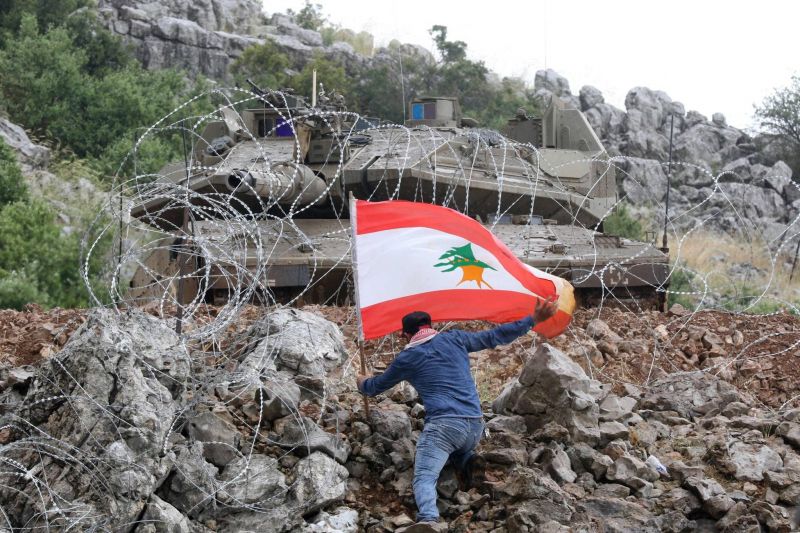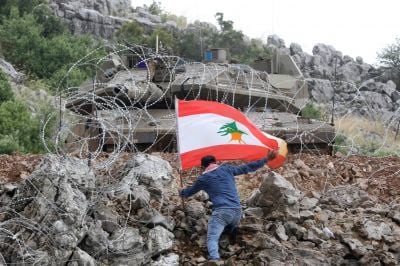
A Lebanese protester plants the national flag across the fence from an Israeli tank during an anti-Israeli demonstration near the "Blue line," the demarcation line drawn by the UN to mark Israel's withdrawal from southern Lebanon in 2000, near the Lebanese southern village of Kafr Shuba on June 9, 2023. (Credit: Mahmoud Zayyat/AFP)
BEIRUT — Israel on Wednesday claimed Hezbollah infiltrated its territory and pitched at least one military tent in recent weeks, according to an Israeli army statement reported by Israeli media outlets.
The statement added that “the matter is known and being handled with all the relevant parties.”
In its statement, the Israeli military said it aims to deal with the tents diplomatically and have a UN peacekeeping force remove them, but threatened that it may use force if they are not successfully removed. As of now, the Israeli military said it believes the tents do not pose a threat to Israel’s security.
L'Orient Today could not find the original Israeli army statement published on either its website or social networks.
According to the Jerusalem Post, Hezbollah placed one tent that was manned by three to eight armed individuals.
Kan (The Israeli Public Broadcasting Corporation), the national broadcaster, which initially reported the story, said Hezbollah's tent was set up opposite the Israeli military and was still there at the time of publication. They also reported that the military initially tried to remove the men "using protest dispersal methods," but they did not budge.
Contacted by L'Orient Today, a senior political bureau member of Hezbollah said he was unaware of the matter.
Andrea Tenenti, a spokesperson for UNIFIL told L'Orient Today he is only aware of one tent in the area of Kafr Shuba in South Lebanon and that he cannot confirm the ownership of the tent. Tenenti also said that tent, which was pitched a couple of weeks ago is located in an area of land disputed on the border between the two states.
"Looking into it. Our troops on the ground, monitoring the situation. Mission in touch with the parties to find solutions," Tenenti wrote in a text message to L'Orient Today.
The Lebanese Army could not immediately be reached for comment.
On June 9, Israeli soldiers fired tear gas toward Lebanese protesters in Kafr Shuba along the southern border during a demonstration in solidarity with farmer Ismail Nasser, who was seen Wednesday defending his land from an Israeli bulldozer.
The UN drew the Blue Line in June 2000 after Israeli forces withdrew from Lebanon on May 25 of that year, ending an occupation that began in 1982. It signifies a "withdrawal line," as much of the border remains disputed.
UNIFIL was created in 1978 as a buffer between Lebanon and Israel, though tensions are common along the border.
In March, fears rose of potential military tensions amid apparent Israeli construction work along the border.
